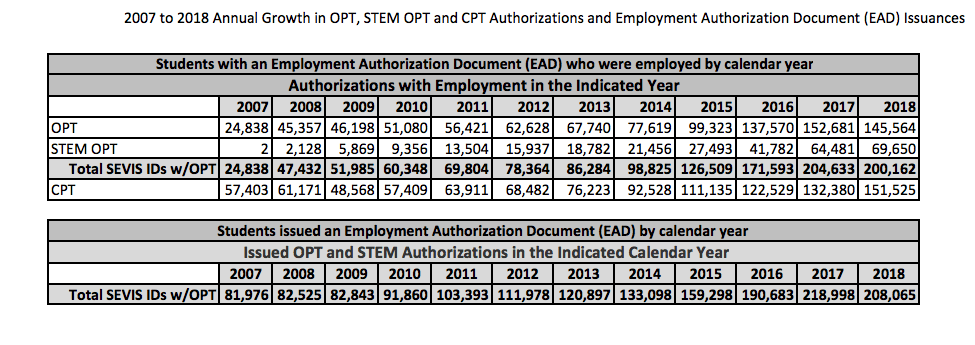The coronavirus epidemic may block many foreign graduates from getting the college-level jobs needed by U.S. graduates this year, according to an article in QZ.com.
The piece of good news for U.S. graduates is a minor compensation for the millions of American college jobs wiped out in the economic crash caused by China’s lethal disease. U.S. students and political activists have begun targeting the program.
Every year, many U.S. universities accept tuition payments from foreign students and then help them get jobs via the little-known Optional Practical Training (OPT) and Curricular Practical Training (CPT) programs. In 2018, 200,000 foreign graduates and 151,000 foreign students got work permits from these two programs, for jobs starting in the summer.
U.S. students and political activists are increasingly protesting the program, which transfers good jobs from Americans to foreign graduates. “You want to win the youth vote?” asked Charlie Kirk, the founder of Turning Point USA, in an April 9 tweet directed at U.S. politicians. “Suspend all visas. That’s right: Every single visa so every single one of those college kids can get a job.”
The OPT program is also being targeted by a lawsuit.
This year’s OPT award process has been disrupted by the coronavirus and the resulting shutdown at the U.S. Citizenship and Immigration Services offices, says QZ.com:
To participate, students must file OPT applications from inside the US and do so during the 120-day period starting 90 days before their graduation. After US president Donald Trump declared Covid-19 a national emergency on March 13, universities rushed to close their campuses. Many international students have left the country since. Unless the US government changes its rule, students who didn’t file for OPT before leaving the US won’t be authorized to work in the US this summer. Unpaid summer internships that don’t earn course credit require OPT approval, too.
Roughly two-thirds of OPT applications are filed in April and May. But federal offices have been closed for several weeks, leaving foreign graduates with little change to meet the deadline 90 days before graduation.
The value of the OPT program for foreign graduates is illustrated in the QZ.com article:
Xiran Sun is a student seeing her career changing because of the combination of Covid-19 and unchanged visa rules. She was on track to graduate from Cornell’s information science program in the spring. She had a job offer to join Goldman Sachs as an analyst. Sun was in China for Cornell’s winter break when Covid-19 shuttered the country. The US’s embassy and consulates closed. She wasn’t able to return to campus. Cornell advised her to suspend her study for a semester. Goldman extended her offer to start in December. But the gap in her study disqualified her from getting an OPT approval, according to the current rules. Sun is now taking an internship in Beijing at ByteDance, the owner of TikTok.
The biggest users of the OPT and CPT programs are elite companies, including Amazon, Intel Corp. Google., Microsoft Corp. Deloitte, Facebook, IBM, Apple, and Ernst & Young.
 Many foreigners enroll in U.S. colleges to get work permits and help win green cards and citizenship. This process generates up to $40 billion in additional tuition fees for U.S. universities each year.
Many foreigners enroll in U.S. colleges to get work permits and help win green cards and citizenship. This process generates up to $40 billion in additional tuition fees for U.S. universities each year.
Roughly 1 million Indian hold contract-worker jobs in the United States, alongside roughly 270,000 Chinese, and a few hundred thousand people from other countries.
Indian officials have reached out to American officials to help Indian students and graduates, said Taranjit Singh Sandhu, the Indian ambassador to the United States. But he offered no evidence that U.S. government is allowing Indian students to register for OPT this year.
“This issue has been raised by us to the U.S. government,” he said April 11, adding, “We also need to be understandable with them … I am sure this issue will be tackled with the full understanding that there is a particular emergency situation which arose, and that will be taken care of.”
USCIS has said little about the impact of the shutdown on the OPT program.
US companies employ about 270,000 Chinese visa-workers instead of sidelined American grads.
They're prominent in elite tech companies, banks & university labs.
Still, they're less obvious than the 1 million Indian visa workers. #H1Bhttps://t.co/pKWfcuj4QQ— Neil Munro (@NeilMunroDC) April 10, 2020
The OPT program creates many opportunities for discrimination against new American graduates.
U.S and Indian professionals have told Breitbart News that Indan managers at elite companies use the OPT program to guide their fellow nationals into coveted jobs and then into the H-1B program. The H-1B program allows foreign graduates to win the huge prize of green cards while they work in the jobs sought by American graduates.
This process is greased by kickbacks to the foreign-born managers, leaving U.S graduates out in the cold — regardless of numerous unenforced laws that bar national and radical discrimination in the workplace, say the U.S. and Indian workers.
The QZ.com author understands the OPT program. In May 2018, she described the parallel CPT program, which allows foreign students and graduates to work in U.S. jobs while they are supposedly studying for a degree:
By day, Swamy works full-time as a software developer in New York City. Late at night and over the weekends he’s a full-time university student, taking courses online. The main reason he does both is, as he puts it, “so that I can keep working in the US.”
For the past two and half years, Swamy has been pursuing graduate degrees at the University of the Cumberlands, a private Baptist university in rural Kentucky. Quartz has decided to withhold Swamy’s last name. He has already completed the credit requirements for a master’s degree in information systems security, and is now working toward a PhD. During his time in the US, he has gotten three master’s degrees in information technology from three universities.
…
“One weekend every term they show up on one of these campuses to study, and they get enough face-to-face time in the United States on an F-1 student visa,” said [the vice president for enrollment and communications, Jerry] Jackson, when he described the design of the new program in a speech to the Southern Kentucky Chamber of Commerce.
Govt data shows 1 million Indian contract-workers get white-collar jobs in tech, banking, health etc.
The Indian hiring ignores many EEOC laws & is expanding amid gov't & media silence.
It is a huge economic & career loss for US college grads.#S368 #H1B https://t.co/pqEW9yJ89c— Neil Munro (@NeilMunroDC) February 17, 2020

COMMENTS
Please let us know if you're having issues with commenting.